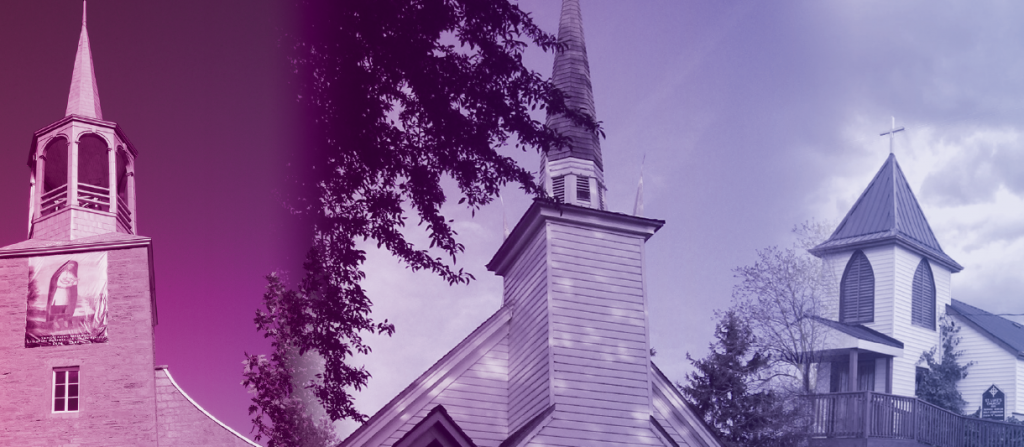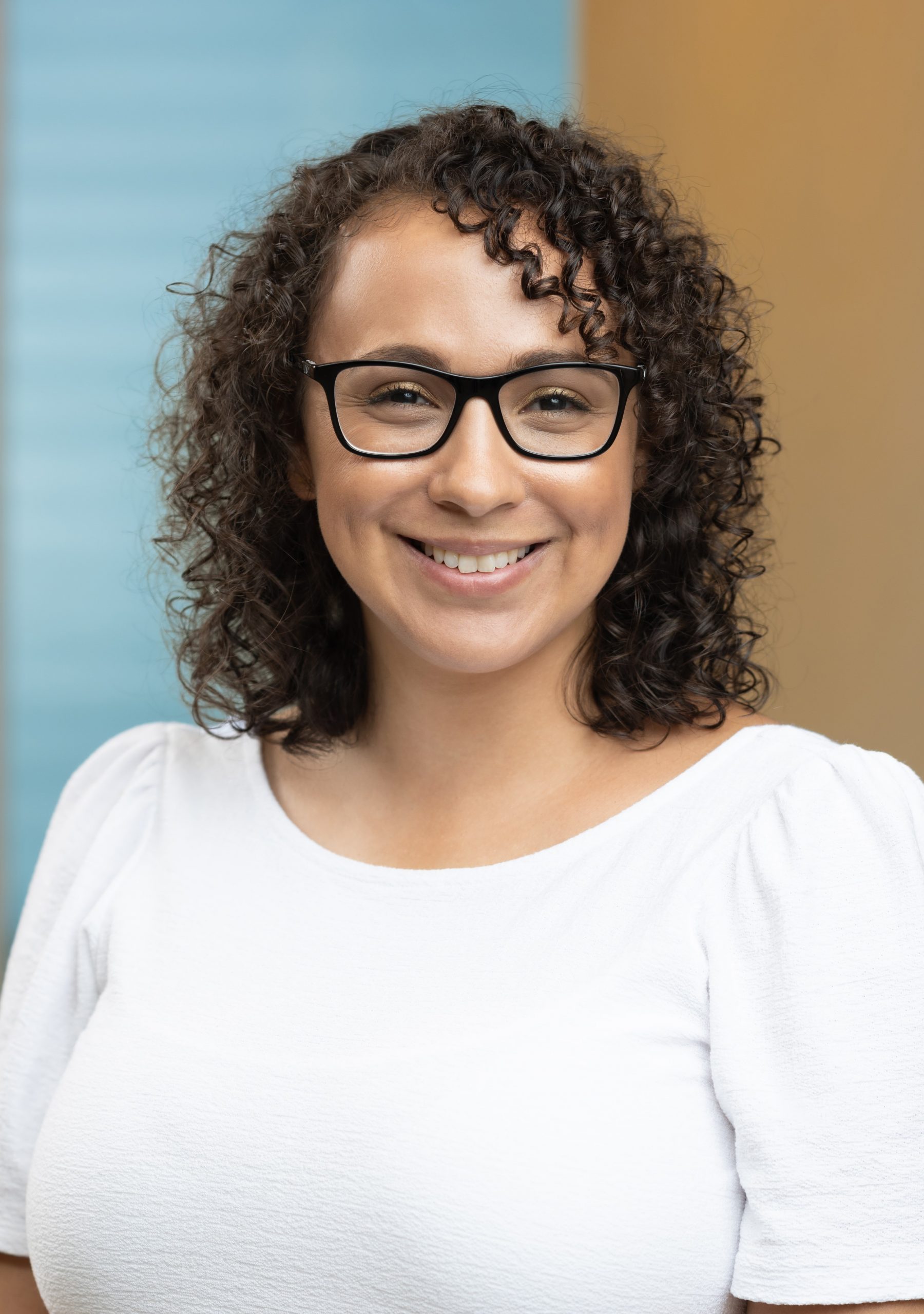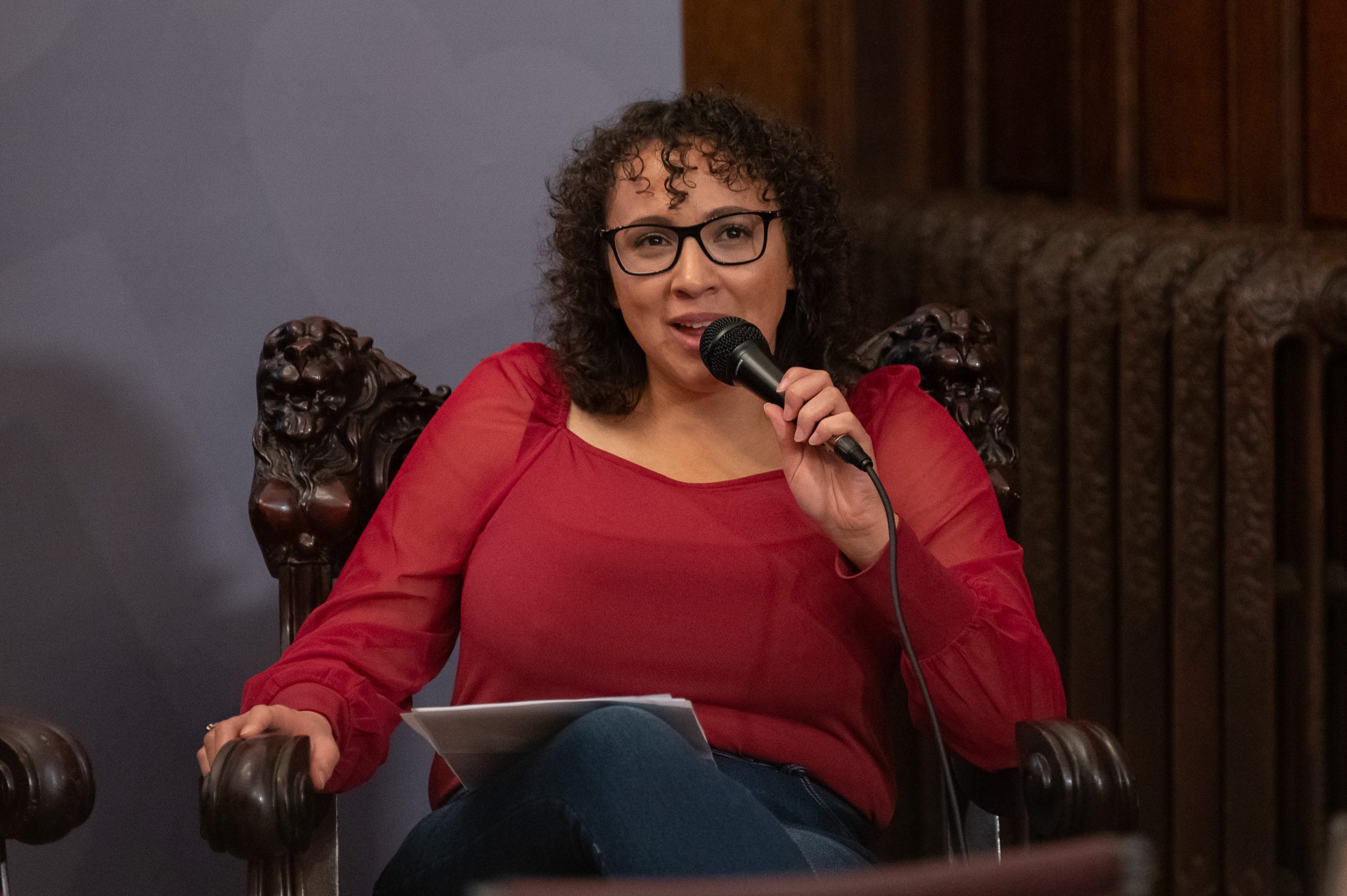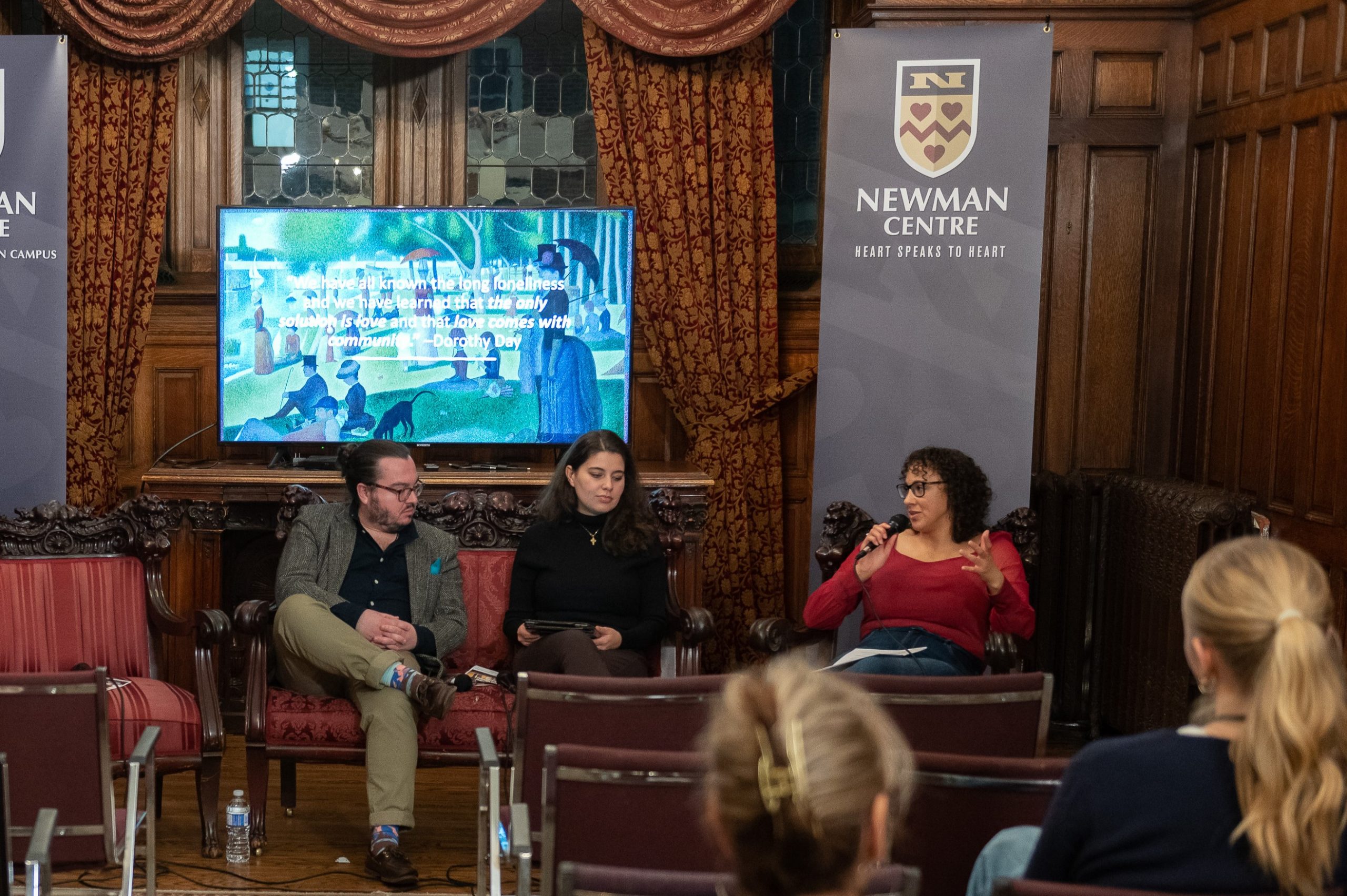Introduction
Indigenous Voices of Faith is a series of interviews conducted by Cardus in the fall of 2022, in which we asked twelve Indigenous people in Canada to tell us about their religious faith and experiences. Since 47 percent of Indigenous people in Canada identify as Christians, Christian voices are the primary but not sole focus of this interview series. The purpose of this project is to affirm and to shed light on the religious freedom of Indigenous peoples to hold the beliefs and engage in the practices that they choose and to contextualize their faith within their own cultures.
Father Deacon Andrew Bennett, program director for Cardus Faith Communities, interviewed Maria Lucas in Toronto, Ontario, on October 27, 2022.
Interview Transcript
Fr. Dcn. Andrew: Thank you again, Maria, for taking part in the Indigenous Voices of Faith project. Why don’t we start off with you telling me a little bit about your own background and your Aboriginal background, and a bit about what you do.
Maria Lucas: Thanks again for inviting me to an interview. So, I am Black Métis. My Black heritage stems from Nova Scotia and the Black Loyalist history there, and my Métis roots stem from northern Ontario. Moose Factory is my ancestral territory. I have not been, myself, to Moose Factory, but it is on the to-do list to eventually get there and be able to visit, although I have made some connection with one community member from there. So that’s my cultural background and context.
I grew up knowing that I was Indigenous but never really knowing exactly from where, until my adult years when my grandmother spoke about it more openly. And so I think by virtue of that I am a bit of a cultural orphan. I should also say that I was brought up Catholic as well. So, I often feel this sort of disconnect between understanding the context of my incarnation, when I could see that some of my other Catholic friends who grew up in a context where they were very much tied to their culture, whatever it may be, and that very much informed their faith journey.
And I couldn’t say that it was the same for me. It was very much trying to figure out where the two sort of met. And it wasn’t until my later years as a young adult that I started undertaking that journey myself, trying to understand where I come from and ask, what is my cultural background, what do I believe, what is my worldview? And as I undertook that journey and continue to undertake that journey, I’m seeing a lot of parallels between my Indigenous background and culture and the Catholic faith. More intersectionality than I think most people may realize. I often think that people think it’s a contradiction to be Indigenous and Catholic. And I find that the more I discover, the more of a fit there seems to be actually.
Fr. Dcn. Andrew: Great. Well, that’s fantastic. Tell me a bit more about your journey. Tell me how that started and just generally about your Christian faith and how it shapes your life.
Maria Lucas: Yeah, so it certainly informs everything that I do. I try to keep to some semblance of a plan of life, and consistency is key in that. I try to do a half hour of mental prayer in the morning and try to go to daily Mass as often as I can and do the rosary, but I don’t do those things in order to check off a to-do list or check off a box and be like, “Okay, it’s done.” It’s more because those are the places that I find strength, and those are the places that fuel my resilience to do the hard work of reconciliation. That is how I see it.
I work as a lawyer. I’m a junior associate at a law firm in Toronto in a very small Aboriginal law practice group. And I always say, it’s small but it’s mighty. And the clients that we serve are often in under-capacitated situations. And so I find that I’m often wearing many hats. I’m a project manager, I’m sometimes an administrative-support person, in addition to “lawyering” responsibilities, for example, legal research and analysis. And then at times, I’m also having to do the intellectual work and be a bit of an academic as well. It takes a lot of energy, a lot of discipline and focus, to do that work. I find that my faith is very integral to supporting it. Otherwise it’s kind of just activism, and for me it loses its meaning if I’m not grounding it in some semblance of a prayer life.
Fr. Dcn. Andrew: Tell me a little bit more about the journey and how you came to be more involved in your Catholic faith and at the same time discovering different aspects of your background. How has that shaped you as you’ve gone on to where you are today?
Maria Lucas: Yeah, so as I said before, I grew up in a Catholic home and in the Catholic tradition, and parallel to that I grew up knowing that I was Indigenous but not really knowing what that meant. As I uncovered some answers to those questions I found that it’s still an ongoing journey. I haven’t arrived at the destination, if there ever really is a destination. So for me, the intersectionality that I find between the two, particularly around relationships, I think of the God we serve. He’s a relationship. And that really, for me, centres the importance of relationship in my life. I’m not somebody who takes well to anything that’s transactional. I’m very relationally oriented, and it’s a disposition that I think we all need to actually foster. It’s a disposition that Indigenous peoples tend to have because of our culture. We tend to see the world through a relational paradigm.
So that definitely informs my approach to all that I do. Like I said, even in my work with clients, on a certain level I get paid a certain amount to do the work that I do for them, but I think having a relationship with your client is also important because it helps to build trust and understanding. This is true particularly in the context that I work in, where Aboriginal law tends to be a very trauma-saturated environment and a lot of Indigenous people have, rightly so, a distrust of the legal system. And so I find myself in a very unique position to be a conduit between the two—to be that bridge. And as I discovered more about what it means to be Métis, I’ve discovered that it means exactly that, to be a bridge, because our origins as a people are a result of two nations coming together and producing a distinct nation known as the Métis nation. I’ve discovered that I’m a bridge between the two. And I see really my law degree and my license to practice law, those are all just tools to be a more effective bridge.
And as I discovered more about what it means to be Métis, I’ve discovered that it means exactly that, to be a bridge, because our origins as a people are a result of two nations coming together and producing a distinct nation known as the Métis nation.
When I look at the parallels with my own Catholic faith as I’ve come to understand it, you can always go deeper on that journey. God’s always revealing things. But as I come to understand my vocation in reconciliation, I’ve come to understand that that very much aligns with a very core piece of our faith, which is the cross. The cross is reconciliation; it demonstrates reconciliation within Christianity. It’s how we are reconciled back to the Father. But it also demonstrates, I think, that reconciliation is not an easy journey. It’s going to be very arduous, because the cross is painful, but there’s also a lot of beauty in taking up one’s cross and carrying it. And you’re not doing it alone. You can only do it with grace.
Fr. Dcn. Andrew: As a Black Métis Catholic, what do you think your particular contribution is to this path of reconciliation? We’ve been hearing a little bit more, especially since the pope’s visit, about the relationship between reconciliation and forgiveness. I was wondering if you could speak maybe a little bit about that from your perspective?
Maria Lucas: This is something I’ve been thinking about more actively, I think, over this past summer, just in light of the papal visit. And someone, a colleague at work who wasn’t Catholic, showed that he understood that, he knew about the Catholic sacrament of reconciliation. And so he said, “Well, there must be some parallels between the two, I would assume.” And I said, “Yeah!” That was actually a pretty deep question. It prompted me to really think. In order for reconciliation to be complete, forgiveness has to be very much a part of the equation. I think it’s truth, forgiveness, and then reconciliation, if you were to put it as an equation. And we often just talk about truth and reconciliation, and I think we’re missing that middle component about forgiveness. Because if one can’t forgive the harm that’s been done, then you can’t really be reconciled.
And when I was talking about the cross earlier, about how that reconciles us to the Father, or the Catholic sacrament of reconciliation, when we go to confession, it’s not just to say everything that we’ve done wrong and just get it off our chest and then walk away. No, it mends that relationship that’s been broken between you and God, between you and your Creator.
That’s very much what truth and reconciliation in the Indigenous context is about. It’s about mending, doing our best with the imperfect tools that we have to mend the harms of the past in order to be able to advance into a future where Indigenous peoples are not on the lowest end of every socioeconomic determinant that we have. Rather, they are very much a part of and included within not just in Canadian society but very much in the structure and governance of this country.
Fr. Dcn. Andrew: I think that’s an excellent point. And again, that relationship between truth, forgiveness, and reconciliation, is this trio you need to have. So that’s a very valid point. You’d made a point earlier, Maria, about how some people see it to be a contradiction to be Catholic and Indigenous. Can you say a little bit more about that? Why do you think it is that some people see that as a contradiction?
Maria Lucas: Yeah, I’ve been asked that by a couple of people, friends, reporters from the media have asked me, “Isn’t that a contradiction?” And I don’t think it is. It’s not a contradiction. Is it a tension, in the sense that the history between Indigenous peoples and the church, and I would emphasize recent history in particular, makes it difficult some days to embrace being part of an institution? Yes. Some days it’s very hard. Because I think how the Catholic Church is structured as an institution was key in the perpetuation of the injustices that we saw or have seen unfold, particularly in the context of residential schools. But if I was Catholic for the purposes of just being a part of this institution, I wouldn’t be today.
It’s not about an institution. Again, I go back to this notion of relationship. It’s about having a relationship with the essence of your being. I pray every day because it’s very hard for me to go a day without speaking to the essence of my being and the reason for being here. I don’t know how else to put it. It’s truth that can only really be encountered through experience, I think, and a prerequisite to that experience is faith. So for me, it’s not a contradiction. If you are a human being, regardless of your cultural context, there’s nothing more integral to your unity as a human person than to have a relationship with your Creator, I’d say. What your cultural context does is help you contextualize that relationship. It helps to inform it and it helps you to live it out, but it’s not divorced from or a contradiction to it.
Fr. Dcn. Andrew: Right. So there’s an integration that’s possible?
Maria Lucas: Yes.
If you are a human being, regardless of your cultural context, there’s nothing more integral to your unity as a human person than to have a relationship with your Creator, I’d say. What your cultural context does is help you contextualize that relationship. It helps to inform it and it helps you to live it out, but it’s not divorced from or a contradiction to it.
Fr. Dcn. Andrew: A number of people I’ve spoken to have emphasized this, this idea of inculturation, that the gospel is received by a particular people or not, and then it is that culture that accepts that fullness. And then it’s not that the gospel changes, culture changes, or rather, they become melded into this new reality. And I’m wondering if you could speak to that point.
You also mentioned a few moments ago about history. We seem to focus a lot on recent history, but what about that broader history of the relationship between Indigenous people, Indigenous Canadians and non-Indigenous? We have roughly four hundred years of shared history now. Speak a little bit about that idea of inculturation and Christian faith and history.
Maria Lucas: So I think that really stems from, first of all, having an understanding that a very core part of Christianity, and Catholicism in particular, is its embracing of freedom and agency. That’s key in order to find the gospel successfully being inculturated in different places around the world, because a culture has to accept it. And then once they accept it, once they exercise their freedom and their agency and the gospel is able to graft itself onto that culture, it brings out what’s most beautiful in it, sort of like a highlighter, I guess you could say. And no one culture does that perfectly. You need all of humanity to really see the gospel in all of its fullness.
But what’s key is that a culture has to accept it and exercise their freedom in accepting it. And I think we often maybe look at history in North America, and we reduce it to: missionaries came over and forced Christianity on Indigenous peoples and they had no say and they had no choice. Well, no. That did happen, in unfortunately many instances, but it’s definitely not the only narrative and it’s definitely not the full truth.
For me, a huge example and hero of mine is St. Kateri Tekakwitha. She’s a woman who chose to convert to Christianity. No pressure, just a Jesuit walking through her village one day and she was like, “Hey, can we have this conversation about your faith and what this is about?” She was curious, and she asked those questions, those probing questions out of her own volition. So to reduce Indigenous-Christian relations to a narrative that’s completely assimilative or oppressive doesn’t do the history justice, in my view.
They made a movie about this in the ’80s, called The Mission. And so in eighteenth-century South America, there were Jesuits who stood with Indigenous peoples during the Spanish-Portuguese invasion of their lands and died next to them trying to defend their land rights and their right to their territory. So I think we’re missing out on a very rich history of Christian Indigenous solidarity and the application of Catholic social doctrine in action. This is not a part of the conversation that we’re having today.
And I know that when I speak, when I do talk in Catholic settings, I try to remind Catholics about that, that being in solidarity with Indigenous peoples is not contrary to our faith. It’s very consistent with it. I think because Indigenous issues often get latched onto the leftist agenda, people think, “Oh, this has Marxist elements, and we can’t get involved.” And it’s not at all about that. I mean, in my view, I think it only gets latched onto the leftist agenda because the left has been more open to having the conversation. But, it doesn’t make Indigenous issues inherently leftist or inherently political either. Catholic social doctrine isn’t political. It’s moral.
Fr. Dcn. Andrew: We’ve gone in some interesting directions, and it raises a really interesting fundamental question, because one could say that from the time of the apostles that the church has been engaging with Indigenous people. Because this small Jewish sect of Christians, to use your words, started walking through someone’s village who weren’t Jews and didn’t know about the gospel. So, almost from the day of Pentecost, Christians have been walking through villages talking about their faith. So that’s looking at the history even more broadly. Maybe you could comment on that.
Maria Lucas: Yeah, it’s something that we’re all called to do. We’re all called to mission in some form or another. And as you pointed out, from the day of Pentecost, that was what Christ asked the apostles to do, to go out and spread the Word. The world was on fire, not literally, but with the words of the gospel. And I think what we’ve seen in recent history in Canada is, in particular, a major switch in the approach to missioning.
I wouldn’t categorize it as evangelization or missioning. It was tied to a very violent project of assimilation and colonization. And so it can’t be what Christ originally intended it to be. Again, I think it was the government and the church coming together and recognizing, “Well, we can use the church’s institutional capacity and structure to carry out our plans for eradicating Indigenous people, either physically or through ideological colonization and assimilation.” So yeah, it was an extreme departure from the early missions and, obviously, from what Christ originally intended for it to be.
Fr. Dcn. Andrew: So what does that mission look like now? Here we are in 2022, we’ve gone through and we’re still going through this period of truth, forgiveness, reconciliation, as you put it. What is the place and the role and the presence of Indigenous Canadians in today’s church as a missionary church?
Maria Lucas: I heard a survivor say that Indigenous people have been doing a lot of work and investing a lot in healing within their own communities. And the survivor posed the question: What is the church doing to heal? What is the church doing to advance with us on this journey? And I think Indigenous peoples are uniquely positioned, by virtue of some of us having experienced firsthand the atrocities that took place. I think because you have a personal connection to the issues you’re that much more invested in finding out the truth.
But I think the Catholic Church in Canada has been completely unaware. There’s been no awareness-raising or education on this point. And I know the responsibility for education and informing people on these issues disproportionately falls to Indigenous people. But I think that if we’re called to mission and we’re called to spread the word as a collective, it’s our responsibility to walk with non-Indigenous Canadians on this journey of truth and reconciliation. But there needs to be reciprocity on the other side. There needs to be a willingness to walk, a willingness to be open, a willingness to learn and do some of the heavy lifting, because we have to do it on both sides. It can’t just be one party doing it and not the other.
In the context of truth and reconciliation, if you were to apply my understanding of evangelization, it’s not a one-way street. It’s a dialogue, it’s a conversation. And that’s, I think, what we’ve been seeing unfold in Canada, I would say really in the past ten years, since the Truth and Reconciliation Commission (TRC) really started doing its work. But I think it’s more in the public eye now. Pre-TRC we had the Royal Commission on Aboriginal Peoples and all of these other studies that were done in the ’90s. So, the TRC certainly wasn’t one of a kind, but I think it was the last study that was done that really thrust these issues into the public sphere in a way that doesn’t allow people to turn a blind eye or to remain ignorant.
Fr. Dcn. Andrew: Excellent. Thank you very much. Do you have anything further that you’d like to say, particularly at a personal level, about your faith and where your faith is leading you now, how it relates to this wonderful work that you’re doing? How is that sustaining you?
Maria Lucas: Yeah, it gives me hope. And I think that’s a very important part of being a faithful Christian, is never losing hope, never despairing. Because I think, particularly in the area of law that I work in, there are a lot of reasons to despair sometimes. At times I feel like giving up and saying “Okay, the cards are stacked against us. There’s no way we’re going to be able to break through. There’s no way we’re going to be able to change structures to make them more equitable and accessible for Indigenous people.” But I think about my own faith, and particularly the Catholic teachings on solidarity, subsidiarity, and human dignity. Those teachings fuel me in a way. They don’t allow me to rest too much, and they don’t allow me to lose my hope and my faith in this work.
But I think about my own faith, and particularly the Catholic teachings on solidarity, subsidiarity, and human dignity. Those teachings fuel me in a way. They don’t allow me to rest too much, and they don’t allow me to lose my hope and my faith in this work.
Fr. Dcn. Andrew: Well, thank you, Maria. I really appreciate the time and the joyful presence that you offer. So thank you very much.
Maria Lucas: Thank you, Father Deacon Andrew.
Photos provided by Maria Lucas.




